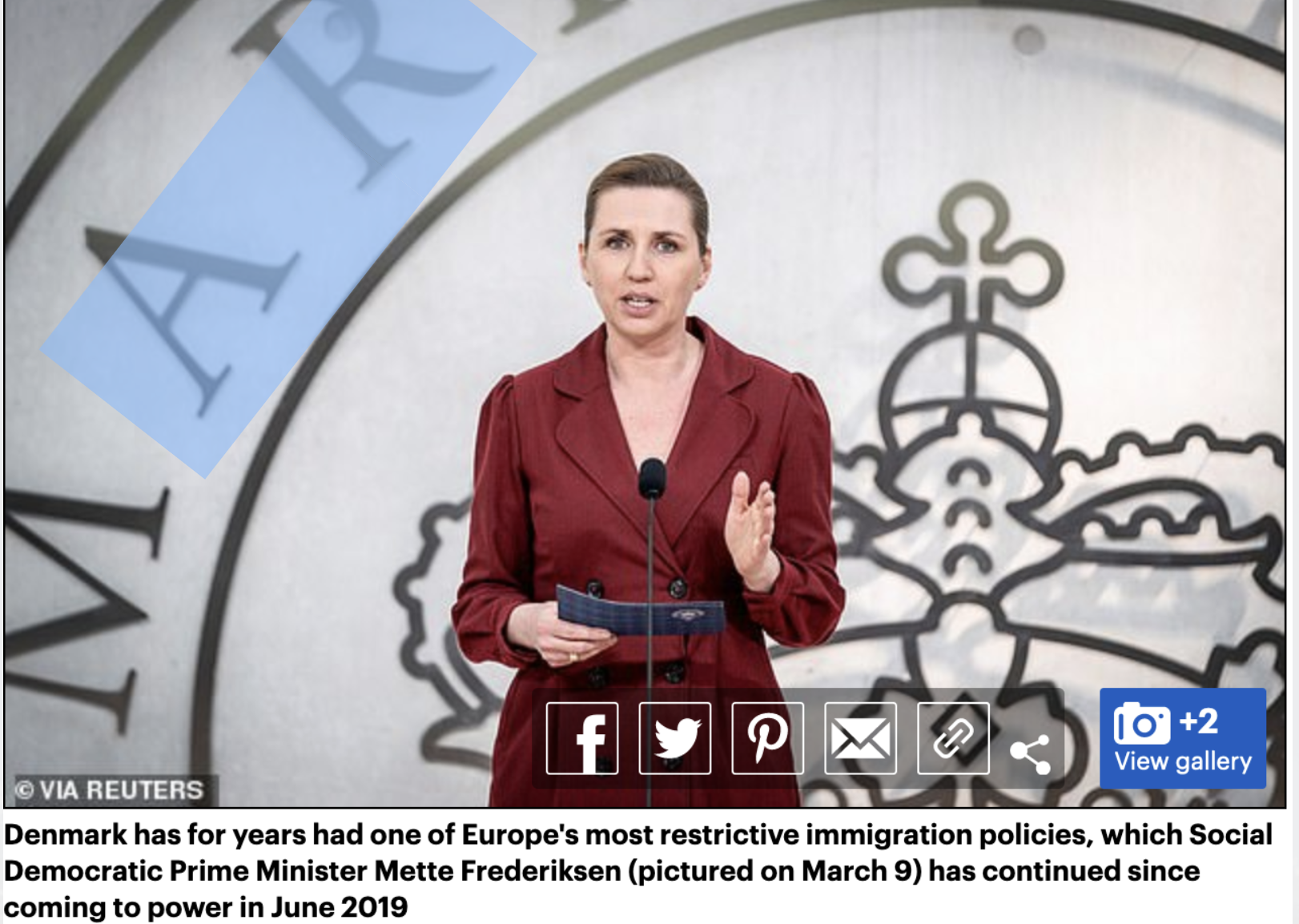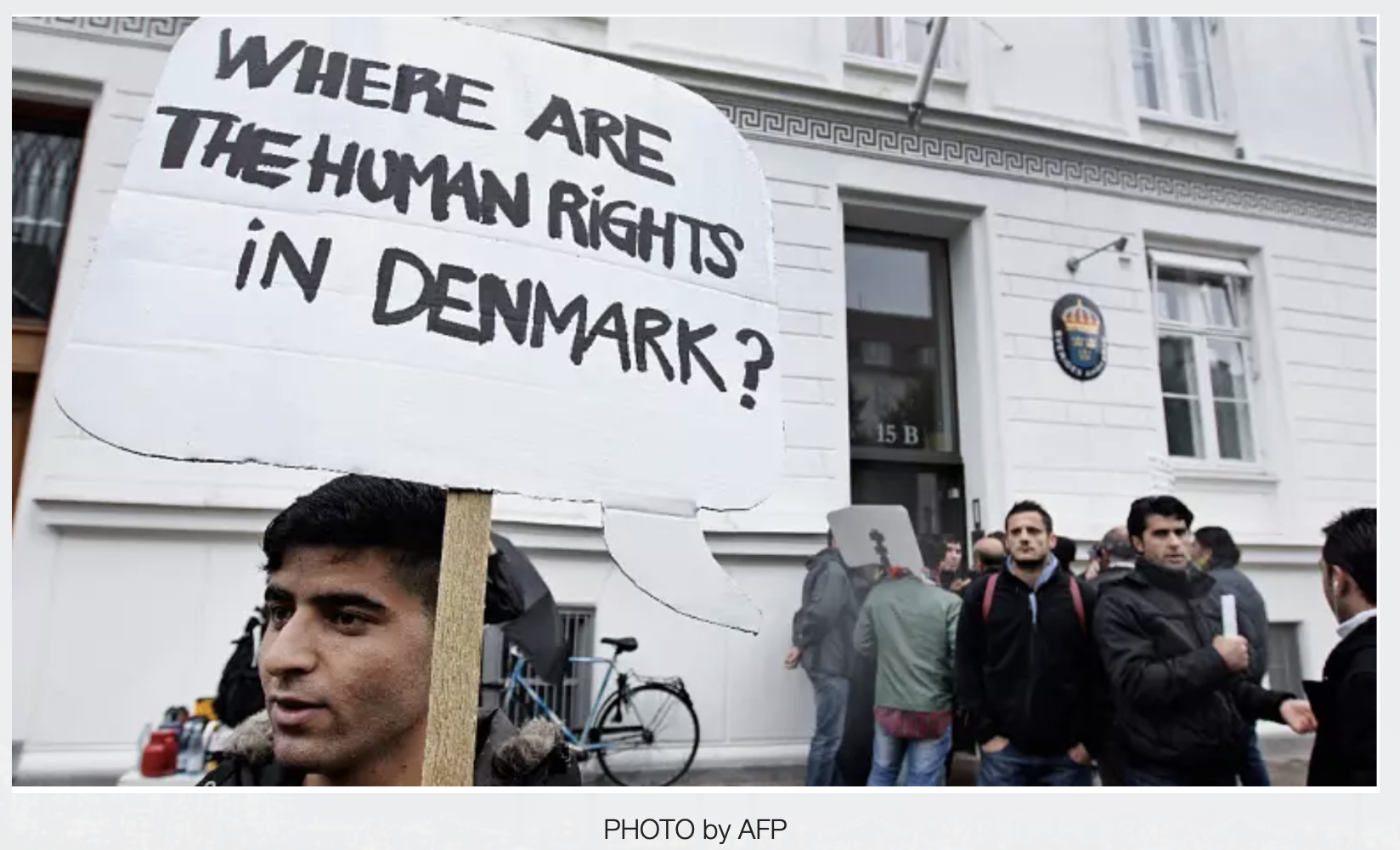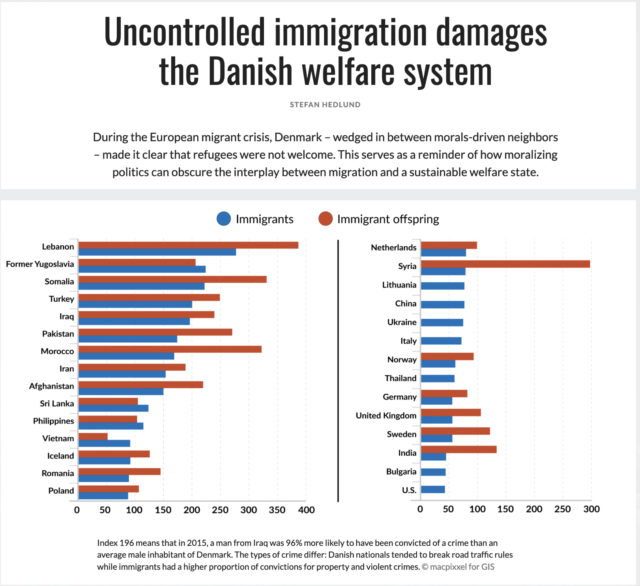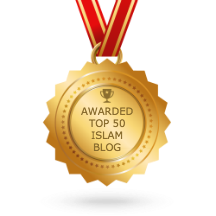The Danish ‘left-wing’ government’s continued push against mass Muslim immigration is producing tangible results, including a dramatic reduction in asylum applications as well as a sharp reduction in overall immigration. The government continues to be unique in all of Europe, featuring the only ruling left-wing bloc seriously opposed to mass Muslim immigration.

REMIX News The numbers speak for themselves, with an 82 percent drop in asylum applications recorded and overall immigration falling 28 percent, according to a new in-depth report from the Foundation for Political Innovation (Fondapol).
Instead of illegal alien Muslim migrant-wannabes waiting in Denmark for their asylum request to be processed, the country’s left-wing government will now begin deporting them to Rwanda after the African country agreed to accept them in a bilateral agreement.
The various hurdles and restrictions enacted by the government have made Denmark far less attractive for immigrants, and have kept the country nearly entirely ethnic European, with the vast majority of the population of Danish descent.
Despite the lack of diversity in Denmark, the country is routinely ranked one of the happiest on Earth, and it excels in terms of per capita wages, quality of life, inequality measurements, corruption, crime rates, and a range of other important metrics.
Many of the European countries run by the left-liberal establishment, which champions diversity as an intrinsic good, may want to examine the case of Denmark. Here are 10 ways the country has put a lid on immigration and satisfied the demands of a population opposed to more arrivals.

Migrants face restrictions at every level
Denmark’s policy is “characterized by a drastic reduction in migration flows, a demanding integration program, difficult access to nationality and, from now on, the willingness to use a third country outside Europe to process visa applications.”
According to the French paper, Denmark’s approach to immigration is described as “restrictive” at every level, including from the moment migrants enter the country to the point they apply for housing, social benefits, and work.
Transparent data
While countries like Germany are racing to hide migrant crime, Denmark has the most transparent data on the topic of nearly any country in the Western world. It not only tracks migrant crime but also breaks down this data between European and non-European offenders.
According to the data, which was examined by French magazine RAGE, non-European migrants commit vastly more crimes than European migrants and Danish citizens. Not only are non-European migrants vastly overrepresented in the crime data, but for certain serious offenses like murder, assault, and rape, the overrepresentation is astounding.
For example, for murder, non-European first-generation migrants are 279 percent more likely to commit murder, 464 percent more likely to commit rape, 220 percent more likely to commit assault, and 53 percent more likely to commit drug trafficking.
“From the second generation, the descendants of non-European immigrants peak at +98% overrepresentation in the crimes committed. Danish figures show that the second generation of non-European immigrants is less integrated than the first, and has an 18% higher chance than their parents of being tried for a crime,” writes RAGE magazine.
Honest rhetoric
The country’s socialist prime minister, Mette Frederiksen, said in 2020: “Every fifth young man with a non-Western background born in 1997 had broken the law before turning 21. There are too many young men who take the freedom of others, steal children’s futures, intimidate prison guards – and leave behind a long trail of insecurity.”
Girls are called derogatory names because they are Danish. Or girls who are subjected to social control because they have become too Danish. A sausage cart in Brønshøj that is attacked with firecrackers (by Muslims) because it sells pork,” she added.
Her candid description of the troubles Denmark faces from Muslim immigrant communities would not be out of place in a speech from France’s Marine Le Pen or from Hungary’s Viktor Orbán. Yet, Frederiksen’s rhetoric on the issue has also been backed by action, and given her left-wing credentials, she has been remarkably immune from criticism from the international press, even if there are occasional hit pieces directed at her.
Demanding integration policies
Denmark’s integration efforts are also extremely rigorous, requiring immigrants to have a command of the Danish language, agree to the country’s values, and know its history. If immigrants are unable to pass the necessary tests in these areas, they will not receive citizenship.
Denmark’s policy flies in the face of current trends. In Germany, for example, the country’s left-liberal government is introducing a new law that will relax language standards for a wide range of migrants, including those over 65 years of age, as well as drop requirements for knowledge about Germany’s history and culture. Such lax requirements are likely to entice more immigrants, whereas many migrants know Denmark is not worth the effort.
Tough policies that discourage immigration
Any migrant issued a prison sentence, even a suspended one, is permanently barred from ever obtaining Danish citizenship. In addition, asylum seekers who show up at the border with jewelry, cash, or any other belongings can have them confiscated in order to cover the costs of processing their asylum claims and housing them.
While such measures may only serve as a minor deterrent for migrants individually, when they are added up, many migrants decide Denmark is best to be avoided. Furthermore, they serve as a symbol that the government and the people of Denmark are not especially keen on more immigrants, which serves as a powerful form of dissuasion in itself.
Explaining immigration’s costs from a left-wing perspective
The left-wing government points to the environmental costs of continuous population expansion due to immigration as well as the extreme burden on Denmark’s generous social welfare model.
In fact, the government describes Denmark’s model as a “social nationalism assumed in the name of the welfare state.” Denmark has recognized it cannot defend its generous social model with an open borders policy, as the world’s poor will swamp the country and, in turn, ruin what Danes have built up over centuries.

Pressure rejected asylum seekers out of the country
For those migrants seeking social benefits in northern European countries, they have a tougher time of it in Denmark, especially if their asylum application is rejected. For asylum seekers with rejected claims, the Danish government halts benefits, allowances, and even sends them to prison, all in an effort to push them out of the country.
Just to the north, Sweden is notorious for handing out citizenship, even for the most questionable foreigners, many of whom feature criminal convictions and a poor lack of integration. In addition, even those who have raped children, participated in gang rapes, or tortured their own pregnant girlfriend are allowed to remain in the country.
Advertise abroad
The Danish government has also advertised abroad, pointing out that the immigration process in Denmark is far less favorable than in other countries. These ads detail how new rules would see a 50 percent reduction in social benefits to new refugees and a one-year delay before they can apply for family reunification.
They send a clear message that Denmark is unfriendly to the idea of mass immigration. This message is reinforced by the political class, such as Minister of Immigration and Integration Mattias Tesfaye, who has gone on record saying multiple times that “my dream is zero asylum seekers.”
Legal carveouts and third-country processing
As a member of the EU, the Schengen Area, and the European Court of Human Rights (ECHR), Denmark has managed to pursue its unique policy by negotiating a series of derogations (op-outs) from the European treaties.
This allows the Danes to legally treat third-country nationals according to their own rules, and has led to Denmark’s groundbreaking program to send migrants to African countries while their asylum claims are being processed, a policy the EU has fiercely opposed but which is supported by the Danish public.
These provisions highlight how institutions such as the ECHR and even the EU itself are designed in such a way to neuter countries’ ability to fight mass immigration and preserve their people, culture, and demographic future.
Success breeds success
These drastic policies implemented by Denmark have had two notable effects. First, the collapse of migrant flows. Immigration fell by 28 percent between 2014, the year before the refugee crisis, and 2019, the year before the Covid-19 health crisis. The total number of asylum applications fell by 82 percent, from 14,792 to 2,716, for a country of 5.8 million people. If this ratio were applied to France, the country would have only 31,000 asylum applications per year, compared to 132,000 in 2019. Just in 2022, France set a record in terms of immigration.
Denmark has one of the highest shares of ethnic Europeans in the country, and the share of non-European births in the country is at approximately 11 percent. In France, for example, it is estimated that 35 percent of all births are non-European, while in Germany it is 24 percent.
Denmark’s success against mass immigration begets more success, and such policies are consistently awarded at the ballot box. While Denmark’s society has some unique elements that enable it to go its own way on the issue of immigration, there is no doubt that if the rest of Europe emulated the country’s policies and attitude, both legal and illegal immigration would see dramatic reductions across the West.

Kudos to the Danish people. While in Copenhagen we took a “Hop-on-hop-off” bus tour with audio. We learned that the Danish people are strong and proud of their heritage. Unlike the wimps that occupy most of Europe and who are setting up their own demise.
Muslim leeches – parasites have already made the inroads to west European societies to be just barely tolerating “First Nation” majorities. Islamic separation and non-integration.
You just blew my brain out of my head.
I’m having to re read this article several times to absorb it.
It’s astonishing.
Your research & and sources are second to none.
Thanks Ziggy, I’ve know for awhile that Denmark had better immigration policies than most of Western Europe, I just had no idea until today that it was a left wing government.
Unfortunately this report is utterly misleading. The cited statements from various ministers and other officials are nothing but smoke screens and Potemkin settings with absolutely no connections to reality here in Denmark. They can get away with all those lies only because the Danish state-owned media are notorious for their one-eyed reporting on all things related to Islam. The slightest form of dissent is immediately censored out and even the few, independent journalists, politicians and bloggers with diverging views are persecuted and ‘law-fared’ into oblivion. Admitted, the situation is not as dire as in Sweden (yet), but given our governments unconditional obedience to the EU and UN, that’s about to change rapidly…
I’m sad to read this. I just commented on the pride and integrity of Danish people…
The Danish people is one thing, the Danish politicians, journalists and ruling class another. I can assure you that ordinary Danes are overwhelmingly sick and tired of Muslims. And that’s why I react to the statements by those ‘talking heads’ in the videos: they know we’re fed up with muslims so they pretend to be harsh on immigration – all the while they do absolutely nothing to reduce said immigration. But thank you for your nice comment anyway!
You`ve got it right.